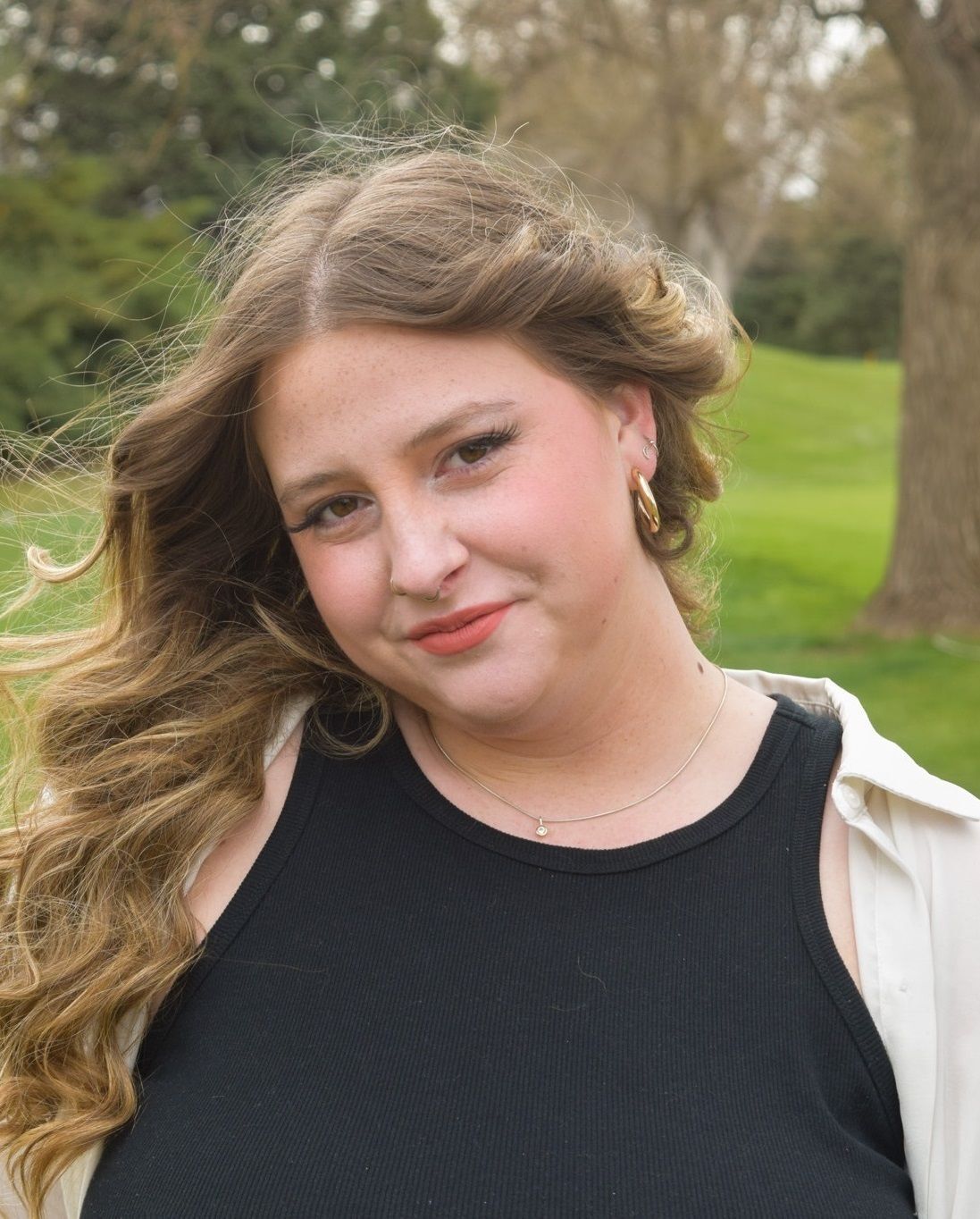
Welcome back to SafeHouse Denver's new series, which explores a typical workday for Advocates across the agency and how their specialized roles support survivors.
Nina Woodman has embarked on a unique professional trajectory at SafeHouse Denver, taking her from an internship to a part-time position as an Advocate at the agency’s non-residential Counseling & Advocacy Center.
In her own words, Nina shares the lessons she has learned along the way and how she has become even better equipped to make a lasting difference in her clients’ journeys toward hope and healing.
How did you get started in the human services field?
“I expected to be working in International Studies. That’s what my undergraduate degree is in. My freshman year of college, I started working with a club on campus that was dedicated towards prevention of gender violence on college campuses. Everything kind of changed after that. I got really involved with that and ended up developing it into a chapter of a nonprofit, and we did a ton of work around gender violence programming, prevention work, even some protesting here and there. I realized that International Studies was not where my heart was, and that gender violence work and gender discrimination and all of the inequities that come with that was really where I needed to be.
“So I decided I would get my master’s in social work, and when I saw SafeHouse was an option for an internship for social work, I remember calling my mom and saying, ‘This is my absolute dream position. I really hope I get it.’ And much to my luck, I was able to! It was and still is the most rewarding, inspiring, fulfilling work I’ve ever done, and I’m so proud to do it every day. I love telling people about what I do for work. So through a very slow journey, I began my work in advocacy – just learning along the way. When a [regular] position opened up, I decided to apply, thinking that it would be a longshot. I was an intern; I didn’t expect to be even considered for the position. And again, with a lot of luck, I was offered it. It’s felt even more amazing to be a part of the team and to feel more responsible for maintaining SafeHouse’s mission.”
How was the transition from intern to Advocate?
“There’s some basic differences, like helping out with Crisis Line shifts – ensuring that we have coverage around the clock and […] a responsibility to pick up when someone has to call out sick. Also, just in client load, and feeling a lot more responsible for what I’m doing with clients. I think I’ve gotten some more difficult cases, likely by coincidence, since coming in. Flexible financial assistance kind of opened up as more of an opportunity since I started working, so putting in a few more hours. I think you lose a little bit of the luxury of clocking out completely at the end of the day when you have things like applications in process, because that takes priority. It’s important to prioritize your time outside of work, but also if I can send a quick email and ensure that a client’s application is accepted sooner, that’s really a priority for me.
“SafeHouse has the opportunity to allocate funds that we received [via grant funding] to different clients through a pretty low-barrier request process. There are never no barriers when you’re allocating finances, which is just part of our legal system. I have mostly used flexible financial assistance to request rent for clients. That’s a pretty high barrier, especially when you’re leaving an abusive relationship, as a lot of clients get strapped with rent that they were splitting between two people. A lot of clients have large amounts of debt from their abusers; all of that financial abuse really starts to pick up and make an impact on their lives, especially after leaving that situation. Flexible financial assistance is nice because we’re able to put in an application – the due date is on Wednesdays – and it’s pretty simple. Put what the request is for, the client’s financial need, why they’re requesting it and make sure that you do a release of information. If it’s something like rent, getting a copy of the lease and the W-9. You turn all of that in on a Wednesday, and [if approved,] we can have the funds as soon as that Friday.”
What are some of the things that an Advocate will do throughout the day?
“I tend to have around four to five clients a day, sometimes even going up to seven. It’s always unpredictable when you’re dealing with populations that have strong barriers to advocacy resources, because it’s not their top priority, and it shouldn’t be. Their needs come first. If you’re worried about when your next shift is coming up at work, or how to pick your kids up or an ongoing legal case – I’m grateful when I do get to take up space in their lives and be there in that time when they have space. There are a lot of client cancellations and rescheduling, so I could have seven hours of clients scheduled in a day and only end up seeing three, or I have a full day. It completely depends. There’s also just a lot of emailing back and forth. I tend to do at least one piece of advocacy work during my day, so if a client mentions during a meeting that they’re really seeking some housing resources or they want to know more about victims’ compensation, then I’ll do a bit of research and try to give them a couple links to investigate and some digestible summaries of what they can look into.
“I do a lot of applications for clients. Flexible financial assistance has been an amazing resource to use. I’m really grateful that when a client brings up how stressed they are about next month’s rent, I have a solution to offer right then. A lot of advocacy work is just compassion and empathy and saying ‘I’m so sorry for the situation’ and ‘That does sound tough,’ but it’s really amazing when I get to offer a pretty immediate solution to a current problem. That’s normally ongoing too. I also do intakes, which some Advocates do and some don’t. I tend to be checking up on intakes, doing some referral calls, seeing which clients are interested in counseling and what they need to get that started. I’m also interested in starting a new support group this summer, but that’s still in conceptualization.”
What is a barrier that you have been able to overcome?
“I think setting boundaries, both for myself and clients, has been a challenge. When you start working in this field, it’s really hard to understand that it’s healthier for everyone when there are appropriate time and space boundaries in place. Because you do want to be there for every concern that pops up in their head; you want to be a resource to use. Especially when clients leave abusive relationships, they’re experiencing large amounts of loneliness and fear and sadness, and everything in the spectrum of emotions. So it’s really great when you can just be the person to talk through that with them, or talk through their concerns or help with an application process. Also realize that if you’re doing that consistently outside of work, and it’s consistently taking up space in your brain, you’re not going to be a better Advocate for it. The more space I give myself outside of work, the better I show up every day.
“So the more space I give my clients, it encourages them to take those steps for themselves. They are incredibly resilient, strong, hard workers – every single client I’ve ever worked with is one of the toughest people I’ve ever met in my entire life. Giving them that space to say ‘I am here,’ but also I trust [them] to do this [work], and I know you can. Typically, clients will surprise you in what they can do while they’re simultaneously processing severe trauma. I tell my clients I’m not driving the bus, but I am sitting on it.”
What is a recent breakthrough or success story that you have experienced?
“I had one the other day that will be my reason for doing this work for a really long time. This client was really struggling with guilt surrounding her abusive relationship. I haven’t encountered a single client who hasn’t felt immensely guilty. It’s just how [the abuser’s] power and control works; that minimizing, denying and blaming perpetuates guilt that clients feel toward themselves rather than where the responsibility should be held, which is within the abuser. She felt like if she had worked harder, things would be different, and she was really questioning going back to her abuser. She was putting all the faults of their relationship, all of the pain that she’d experienced through it, on herself. She didn’t feel like she’d be happy again.
“I brought up the idea that […] this is the first time in your life – they’d been together a really long time, 20 years – that you are going to wake up in the morning and no one’s going to tell you you’re doing something wrong. You get to buy whatever you want at the store. You get to go out with your friends and no one’s texting you asking where you are every five minutes. No one’s going to be telling you it’s your fault that you didn’t meet this unforeseen need, or it’s your fault that you didn’t anticipate exactly what they want. [Starting over] can be traumatizing, it can be terrifying… but it’s also exciting. And I had not seen her experience any gratitude for the end of her relationship, or any pleasure in that, up to that point. She walked out of that session smiling and saying that she felt ready. Healing from trauma can be the scariest, hardest thing you do in your life, but it can also be one of the most freeing, liberating and joyous experiences.”
Why is working with survivors important to you?
“Abuse – all forms, but especially intimate partner violence – centers around a value system rooted in entitlement. People believe that they are entitled to your time, your energy, power and control over you, your space… they are entitled to get what they want exactly when they want it. Doing this work, working with survivors, means giving people permission to take their own space. Giving people permission to listen to their needs, their desires and their wants. I think why intimate partner violence is so effective [to abusers] is that not only does it capitalize on the entitlement of the abuser but it also capitalizes on the empathy of the survivor. [Healing] is about respecting and embracing and loving our empathy, but also understanding that just because we feel for other people does not mean that they are entitled to everything from us. It’s setting those healthy boundaries, and setting a boundary can mean leaving a relationship. It can mean going no-contact with someone. Setting a boundary could also mean co-parenting and ensuring that we’re only talking as parents. Setting a boundary – maybe if it feels right for the survivor; it’s not my place to decide – could mean staying with the abuser but leaving when things get too aggressive on a certain day. It’s their choice when those boundaries feel right for them, but it’s also empowering that your empathy does not mean that you lose boundaries.
“Privilege plays into [domestic violence] such a great deal, and I don’t ever want that to get lost in the work. Survivors experience other barriers outside of their intimate partner violence, and that makes it incredibly challenging to leave and incredibly difficult to heal from it. If everyone had unlimited resources – financially; healthy relationships to build upon; access to education and housing and support as a whole – intimate partner violence would not be a problem. It’s because of that isolation and manipulation that these barriers begin to build up and feel like it’s impossible to leave. As important as it is to address education and emotional support, it’s also really important that we as an organization and as providers are addressing what barriers impact each community that our clients exist within.”
Learn more about SafeHouse Denver’s full continuum of trauma-informed services to support survivors of domestic violence and their children. If you or someone you know is experiencing domestic violence, call our 24-Hour Crisis & Information Line at 303-318-9989. We are here for you!
Follow us on Facebook, Instagram, LinkedIn or YouTube to see Nina discuss more about these meaningful topics!

